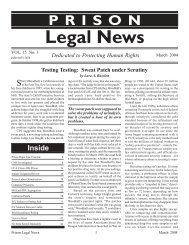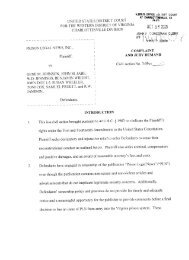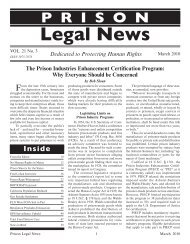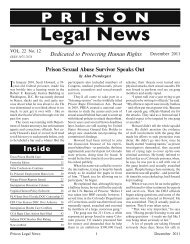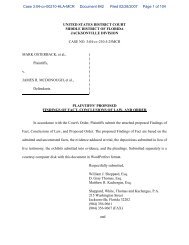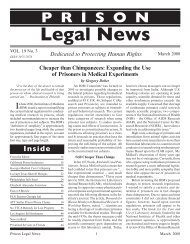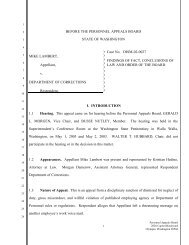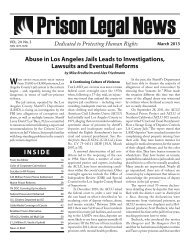From the Editor - Prison Legal News
From the Editor - Prison Legal News
From the Editor - Prison Legal News
Create successful ePaper yourself
Turn your PDF publications into a flip-book with our unique Google optimized e-Paper software.
April 2008<br />
Wrongful Death Following Alleged Mistaken Washington<br />
Jail Release Settles For $1,800,000<br />
On September 6, 2007, <strong>the</strong> City<br />
of Algona and King County,<br />
Washington, agreed to pay $1,800,000 to<br />
<strong>the</strong> estate of a man killed by a hit and run<br />
driver who was, according to <strong>the</strong> lawsuit,<br />
mistakenly released from jail despite<br />
multiple convictions for driving under <strong>the</strong><br />
influence (DUI).<br />
Michael McGuire, 48, was allegedly<br />
run over and killed by a pick up truck<br />
driven by Tracy Enoch-Jevne on December<br />
2, 1999. Enoch-Jevne was arrested<br />
several hours after she left <strong>the</strong> scene of<br />
<strong>the</strong> accident. She already had four DUI<br />
convictions on her record.<br />
Two months prior to <strong>the</strong> hit and<br />
run, Enoch-Jevne had been transferred<br />
from <strong>the</strong> Pierce County Jail to <strong>the</strong><br />
King County Jail in order to work off<br />
sentences from multiple DUI and drug<br />
convictions she received between 1996<br />
and 1999. At <strong>the</strong> time of her transfer she<br />
had at least two months left to serve on<br />
a 1996 DUI conviction she picked up in<br />
<strong>the</strong> City of Algona. Upon her transfer to<br />
King County, a judge gave Enoch-Jevne<br />
credit for time served on an unrelated<br />
DUI charge and released her after just<br />
three days in jail.<br />
Following his death, McGuire’s wife,<br />
Susan, filed suit on behalf of herself, her<br />
dead husband, and <strong>the</strong>ir 24-year-old son<br />
who was a minor at <strong>the</strong> time of <strong>the</strong> accident.<br />
Ms. McGuire claimed that <strong>the</strong> City<br />
of Algona should have made King County<br />
aware of Enoch-Jevne’s unserved jail<br />
time and that King County should have<br />
reviewed her records and discovered <strong>the</strong><br />
remaining sentence. Ms. McGuire fur<strong>the</strong>r<br />
contended that <strong>the</strong> Washington Department<br />
of Corrections (WDOC) should<br />
have arrested Enoch-Jevne in October<br />
1999 after she violated <strong>the</strong> conditions of<br />
her parole.<br />
The City of Algona and King County<br />
agreed to settle <strong>the</strong>ir part in <strong>the</strong> lawsuit<br />
for $1,800,000, with Algona paying <strong>the</strong><br />
entire amount because King County was<br />
jailing Enoch-Jevne on a contract basis<br />
for <strong>the</strong> city.<br />
McGuire is still seeking damages<br />
from <strong>the</strong> remaining defendants, including<br />
<strong>the</strong> WDOC. Trial was set for December<br />
3, 2007. In May 2000 Enoch-Jevne was<br />
found guilty of vehicular homicide and<br />
sentenced to eight years in prison.<br />
McGuire was represented by<br />
34<br />
Stephen L. Bulzomi of Tacoma,<br />
Washington. Her experts included<br />
Warren Cook (corrections) of Portland,<br />
Oregon; Bonnie Baker, Ph.D.<br />
(psychologist) and William Stough<br />
(corrections supervision), both of Spokane,<br />
Washington; and Robert W. Moss<br />
(economist) and Dan Hall (corrections/<br />
offender supervision), both of Seattle,<br />
Washington. See: McGuire v. Enoch-<br />
Jevne, Pierce County Court, Case No.<br />
99-2-14157-7.<br />
Overcrowded, Understaffed California<br />
DOC Pays $471 Million in Overtime<br />
combination of prison overcrowding<br />
and a 10.9% staff<br />
A<br />
vacancy rate in <strong>the</strong> California Department<br />
of Corrections and Rehabilitation<br />
(CDCR) resulted in $471 million in overtime<br />
being paid in fiscal year 2006-2007<br />
– a 17% increase over 2005-2006. More<br />
than 8,000 CDCR employees collected at<br />
least $25,000 each in overtime, with 1,423<br />
pocketing over $50,000.<br />
Some employees’ overtime earnings<br />
were truly eye-popping. Thirty-six, including<br />
guards as well as medical staff, received<br />
over $100,000 in overtime. Nine of <strong>the</strong> top<br />
ten overtime recipients in 2006 worked<br />
more than 1,900 hours beyond <strong>the</strong>ir 2,080<br />
regular hours. Nurse Jean Keller accumulated<br />
no less than 2,584 overtime hours,<br />
earning $156,000 on top of her $74,000<br />
base pay. Folsom prison guard Patro<br />
Lagula worked 2,314 hours of overtime,<br />
adding $126,000 in excess pay. Six CDCR<br />
employees earned more than Governor<br />
Schwarzenegger’s $212,179 salary.<br />
These absurdly high overtime figures<br />
were cited in a February 7, 2008 report<br />
by <strong>the</strong> Legislative Analyst’s Office, which<br />
recommended against increasing <strong>the</strong> pay<br />
rates for CDCR guards. The Governor’s<br />
office has proposed a 5 percent raise for<br />
state prison employees.<br />
Driving <strong>the</strong> excessive overtime are<br />
4,000 staff vacancies – half for guard<br />
positions. Under union rules, overtime<br />
is offered first to <strong>the</strong> most senior guards,<br />
<strong>the</strong>reby shifting costs upward due to <strong>the</strong>ir<br />
inherently higher base pay. Additional factors<br />
driving overtime include <strong>the</strong> federal<br />
court-appointed healthcare Receiver’s<br />
demand for more medical staff, which has<br />
resulted in an increased number of guards<br />
needed for hospital visits and medical<br />
escort services.<br />
Ano<strong>the</strong>r major cause of overtime is<br />
by John Dannenberg<br />
guard sick leave, which has resulted in<br />
costs spiraling from $69 million in 2003-<br />
2004 to $152 million in 2005-2006. The<br />
increased use of sick leave has led to more<br />
overtime because a modification to <strong>the</strong><br />
guards’ contract permits <strong>the</strong>m to work<br />
four days, call in sick (without a doctor’s<br />
excuse) on <strong>the</strong> fifth, and <strong>the</strong>n work at<br />
overtime rates on <strong>the</strong> sixth day. The state<br />
is trying to jettison this abused provision<br />
in its current contract negotiations with<br />
<strong>the</strong> California Correctional Peace Officers’<br />
Association (CCPOA), <strong>the</strong> union that<br />
represents <strong>the</strong> state’s prison guards.<br />
The CDCR is trying to build its way<br />
out of its chronic overcrowding problem.<br />
Doubting that will work, a three-judge<br />
federal court panel has been convened<br />
to consider capping California’s prison<br />
population. In order to dodge <strong>the</strong> bullet<br />
of a court order to reduce <strong>the</strong> CDCR’s<br />
population from 172,000 to 135,000 to<br />
alleviate overcrowding, <strong>the</strong> state proposes<br />
spending $7.4 billion to build 53,000 more<br />
beds, most within existing prisons. Of<br />
course such an expansion would fur<strong>the</strong>r<br />
exacerbate <strong>the</strong> staff shortage problem<br />
and hence increase overtime costs even<br />
more. The only viable way to address <strong>the</strong><br />
staffing shortage comes from <strong>the</strong> CDCR’s<br />
plan to transfer 8,000 prisoners to out-ofstate<br />
private prisons, a move <strong>the</strong> powerful<br />
CCPOA fiercely opposes.<br />
This leaves <strong>the</strong> various parties in a bitter<br />
stalemate. The guards object to using<br />
out-of-state transfers to remediate <strong>the</strong>ir<br />
insufficient numbers; <strong>the</strong> federal court<br />
wants immediate relief from overcrowding,<br />
not “by <strong>the</strong> year 2014” as proposed<br />
in <strong>the</strong> state’s $7.4 billion building plan;<br />
<strong>the</strong> California Legislature’s 2007-2008<br />
budget does not include funding for a<br />
$300 million increase in guard base salaries<br />
estimated to flow from a new contract with<br />
<strong>Prison</strong> <strong>Legal</strong> <strong>News</strong>



